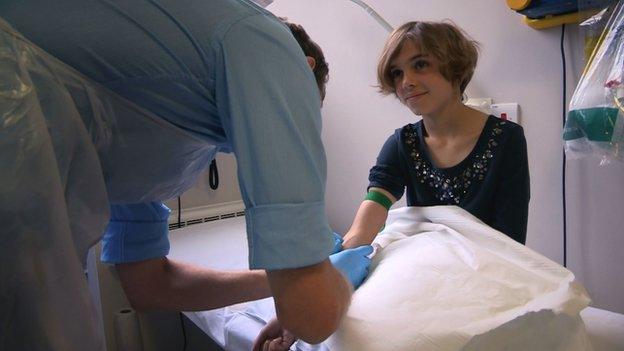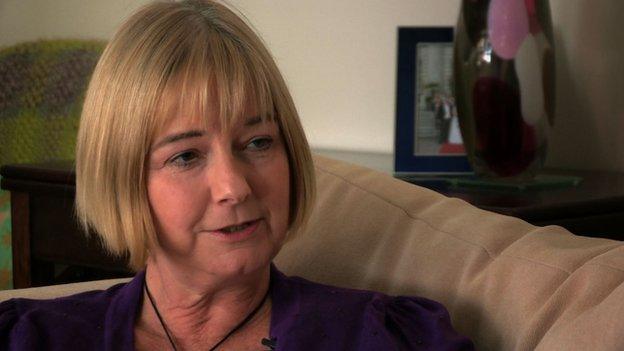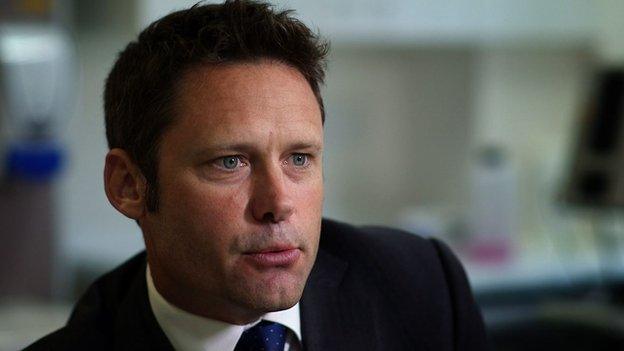Defeating cancer, the 'evil genius'
- Published
- comments

Sophie Armitage has been described by her consultant as a miracle child
"If you had to describe cancer I would say it's an evil genius."
It's a vivid metaphor from Dr Udai Banerji, of the Institute of Cancer Research and the Royal Marsden, for the challenge facing patients, scientists and clinicians.
Dr Udai Banerji: "We have a huge effort trying to understand cancer evolution"
Over the past 18 months, I've been part of a Panorama team that has followed a group of remarkable cancer patients who are on clinical trials run jointly by the two organisations.
I met patients like Sophie Armitage, who was diagnosed with a rare form of cancer called IMFT when she was just nine; and Tami Morris, who has had ovarian cancer for more than a decade.
Tami, like many of those in the trials, has advanced cancer, which has spread from its original site to other parts of the body.
Targeted
With Sophie, the tumour was localised, but growing around her airway and so making it both dangerous and difficult to treat.
Both patients are on different forms of targeted drug treatment, part of a new range of weapons against cancer.
Unlike conventional chemotherapy, which attacks all rapidly dividing cells, targeted drugs focus on the genetic mutations that drive cancer growth.
The key to this new generation of cancer drugs is our greater understanding of human genetics.
Fergus Walsh meets Sophie, patient at the Royal Marsden
A revolution in DNA sequencing means the disease can be mapped faster, cheaper and in greater detail than ever.
For Tami Morris, it has meant that pills she takes at home have replaced and outperformed chemotherapy.
She told me: "Five years ago, before the Marsden, I thought that was it. But they've given me a good four years so far."
Tami has been on a succession of different targeted treatments designed for patients with specific mutations in their cancer.
Resistance
Although the drugs have often worked well for some time, eventually her cancer has developed resistance to them, meaning her doctors have had to keep switching her medication.
Cancer resistance is probably the biggest problem facing scientists.
Researchers at the ICR labs in London discovered some years ago that cancer survives through Darwinian evolution.
Prof Johann de Bono is in charge of nearly 40 early drug trials: "Resistance is a major issue because these are cancers that are genetically unstable, they can change and they evolve, we call this clonal evolution."
But new drugs are coming through all the time, and so far, the doctors at the ICR and Royal Marsden - who divide their time between laboratories and the clinic - have been able to find a new treatment for Tami.
By using drugs in combination or even in rotation, scientists are trying to keep pace with cancer resistance.
Professor Johann de Bono
It will be a key strategy in transforming the disease into a manageable long-term condition.
Of course, the prospects for cancer patients are far brighter now than ever.
Although one in two of us in our lifetime will hear the words, "You have cancer," survival rates have doubled in the past 40 years.
Currently, one in two cancer patients will live at least a decade, and that proportion is increasing each year.
Some, like Sophie Armitage, can hopefully look forward to a future free from the disease.
Her tumour was due to a faulty ALK gene, which creates a chemical signal that drives the growth of abnormal cells.
The experimental drug she is taking, LDK 378, blocks those messages.
'Miracle child'
The treatment is showing promise against some forms of adult lung cancer.
Sophie had been facing surgery to remove one of her lungs.
But within weeks of starting on the trial her tumour had shrunk from the size of a plum to that of a hazel-nut.
It has continued to shrink to a point where doctors believe it may be completely inactive.
Her consultant, Dr Louis Chesler, described Sophie's case as life-affirming.
"It's the goal of every paediatric oncologist to see that kind of response.
"It's truly astonishing and miraculous to see. I think we told her in the clinic that she's unique, and that really she's a miracle child."
Sophie, who's now 11, says being part of a medical trial has spurred her on to think about what she will do in later life.
She told me: "I've always wanted to be a doctor, and now I've gone through all this I want to be a doctor even more."
Immunotherapy

Vicky Brown's melanoma was found only after it had spread to her breast and lungs
As well as extending life with targeted treatments, scientists are also exploring how to harness the body's inbuilt defences by boosting the power of the immune system.
Cancer immunotherapy has had some spectacular success in recent years, notably in the treatment of malignant melanoma - an aggressive form of skin cancer.
Vicky Brown's melanoma was found only after it had spread to her breast and lungs.
Until recently the life expectancy for patients with such advanced disease was around six months, but Vicky enrolled on a trial at the Royal Marsden comparing two immunotherapy treatments, ipilimumab and nivolumab.
These drugs help the body's killer cells to recognise cancer cells and prevent malignant cells from blocking the natural immune response.
Vicky had to come off the trial early as she developed hepatitis and meningitis - serious but treatable side-effects which were the result of her immune system being supercharged.

Dr James Larkin is hopeful that immunotherapy may be able to deal with the problem of resistance
Fortunately, by then the immunotherapy had worked and she remains clear of cancer after more than a year.
Vicky said: "I can really get on with my life and put this in the back of my mind."
Her consultant at the Royal Marsden, Dr James Larkin, is hopeful that immunotherapy may even be able to deal with the problem of resistance.
He told me: "With immunotherapy, you've reprogrammed the system so inside the patient you have an immune system that can recognise tumour cells.
"If a bit of the tumour does become resistant, the experience to date certainly seems to be that the immune system can still deal with that."
Several immunotherapy drugs are undergoing trials for other cancers, such as lung and kidney, and early results look promising.
Like all new cancer treatments, they are expensive - just one of the drugs Vicky was given costs £75,000 per patient, although the NHS has negotiated a confidential discounted price.
So while these new weapons offer the hope of keeping cancer at bay for longer, they present hard choices for health spending.
Panorama's 'Can You Cure My Cancer?' is on Wednesday 11 February at 21:00 on BBC One.
- Published4 February 2015
.jpg)
- Published3 June 2014